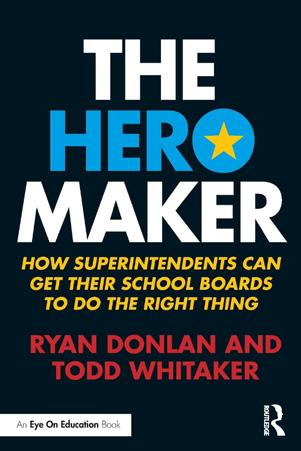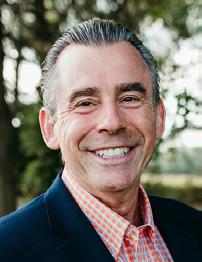
5 minute read
The Hero Maker
By Dr. Todd Whitaker
The relationship between school boards and the superintendent is incredibly fascinating and complex. The superintendent is typically chosen and hired by a school board and then answers to this same leadership body. This seems simple enough. A relationship like this is traditional in many workplaces – we get hired by someone and then also must follow his or her leadership and expectations. Most jobs fall under this type of a structure. However, there are many factors that make this dynamic much more complicated.
A board is not one person, which we can picture as a traditional “boss.” Instead, it is a group of individuals who may or may not function together in a healthy or professional fashion. Additionally, it may be a group in which the membership is comprised of changing people. A new superintendent might get selected unanimously by a five-member board, and just months later, there may be three new “supervisors” in place because there was an election that resulted in a 60% turnover of “leadership.” These new members may have a completely differing vision of what they want from a superintendent, and this vision may not just vary from the three members they replaced; it may differ dramatically from the two existing members and each of the other recently elected officials. In and of itself, this is an incredible challenge, but amazingly, this may be the easy part. What is unique is that superintendents must then have the skills and abilities to lead their “bosses.”
Diversity in the Ranks
School board members may have incredibly varying backgrounds. Some may be former teachers, principals, or even previous superintendents. Within this group there can be past successful educators who get the “big picture” and work to help advance the district to do what is best for all students and staff. Also within this group may be someone who was fired by the school board and potentially has a desire to hold the current members, and even you, as a personal target, and that is this person’s biggest incentive to become a district leader.
Some school board members have successful businesses, and others have nothing else to do. There may be individuals with five children currently enrolled in the district and others with zero. There can be board members who have a district perspective and others who have the goal of getting their niece a job as a teacher. One member may be a lover of sports, while another wants the football coach fired because his son is not the starting running back. One feels that cheerleading should have additional funding for new uniforms, while others have the view that the spirit squad should be disbanded.
There may be members of the group who have advanced degrees and others who only graduated from the school of hard knocks. Some have a wealth of common sense, and others seem to have a dearth of it. Put all these different perspectives and views together, and it can seem overwhelming. But the next challenge may be even more daunting. With no positional power over the board, the superintendent must be able to teach and influence these individuals to function together to make decisions based on what is best for the students and best for the school district. Being able to do this with no formal organizational advantage is a task that at times can seem challenging and even overwhelming. How is it possible to lead our “bosses”? Should we even attempt it? Are there ways that are more effective in doing so?
Are There Any Commonalities?
Upon first reflection it may seem an insurmountable task to lead this group of individuals down a common path when they potentially have such dramatically differing backgrounds and viewpoints. Is there anything we can do to influence those who are our employers when we are just the lowly employees who are required to answer to them?
Though it may seem that a group that can vary so much may not have a common ground, there is one thing they share. All school board members want to be a hero. That’s right, a hero. And your job is to help them accomplish this in a positive and productive fashion.
The board member who runs to cut taxes, the individual who has a goal of getting rid of the girls’ basketball coach, and the person who wants to help pass a referendum to build a new school all have one shared outcome. They want to be heroes. You may be thinking that some of these viewpoints would make them lots of enemies or is a harmful result from your perspective. You may be correct. They may be in the minority or have an aim that would lead to more harm than good. But in their mind, if they accomplish what they set out to do, the result is that they will be heroes to someone who matters to them.
They may feel like their daughter will be so proud of them if Mom can get on the board and get rid of the basketball coach who cut her baby girl from the squad their sophomore year. They may interact with a political group
Making Heroes
One task a superintendent must focus on is how to make these individual board members “heroes” by helping them do the right thing instead of their independent aims, which may not be what is best for the students and district. When we can accomplish this, we can then help our supervisors come together in a more cohesive way to realize their goals of being a hero. One of the primary purposes is to help district leaders understand the importance of making heroes. A second and potentially more challenging aim is to help teach and develop the specific skills needed to best be able to accomplish this daunting task.
If you are a district leader, you are highly aware of the incredible responsibility you have. Every day your actions and decisions influence hundreds and thousands of young people in your schools. You knew this when you chose your leadership role. You wanted to make a difference. Now we must figure out how to make an impact. Your students deserve it. The final goal is to help school leaders understand that making others into heroes accomplishes the same result for themselves. A true hero is someone who helps others accomplish things they didn’t think was possible. Thanks for what you do. Thanks for making a difference. Every day. ■ that wants to cut taxes, and if they can help make this happen, they can then be supported to run for a more significant office in the community. An individual could hope to be elected or appointed to the board so that funds can be raised to build a new high school that will positively impact future students and the community for generations to come. Though in some ways their goals may seem to be contradictory in nature, the underlying aim is to be held in a more positive regard by others.


Recognized as a leading presenter in the field of education, Dr. Todd Whitaker’s message about the importance of teaching has resonated with hundreds of thousands of educators around the world. Dr. Whitaker is a professor of educational leadership at the University of Missouri. Prior to moving into higher education, he was a math teacher and basketball coach in Missouri. Dr. Whitaker then served as a principal at the middle school, junior high, and high school levels. One of the world's leading authorities on staff motivation, teacher leadership, and principal effectiveness, Dr. Whitaker has written more than 60 books.












